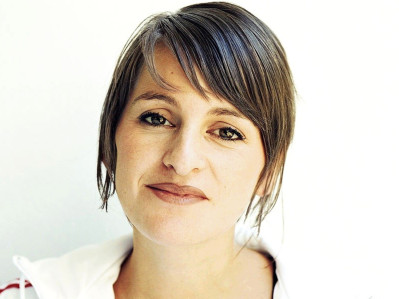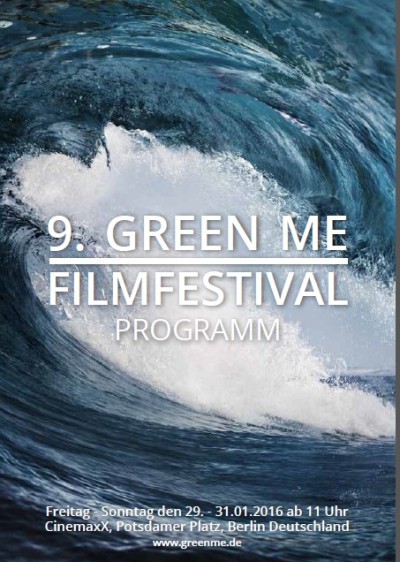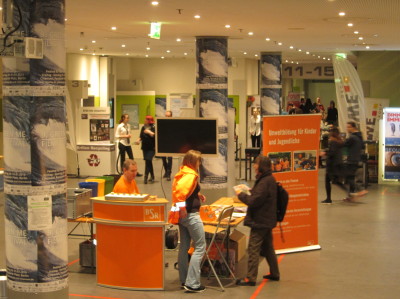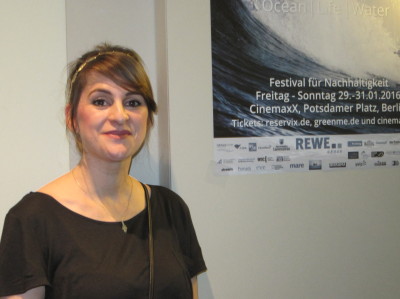 Delphi Breger became known as an actress especially by the movie "Scherbengericht" (Ostracism) (2013). Since 2014, she is programme director of the Green Me Film Festival in Berlin.
Delphi Breger became known as an actress especially by the movie "Scherbengericht" (Ostracism) (2013). Since 2014, she is programme director of the Green Me Film Festival in Berlin.
Sustainable living is a major, even her personal, concern. Mundus maris asked Delphi Breger shortly after the festival, how the programme came about and what she hoped to achieve.
MM: What caused you to chose, "ocean, life, water" as this year's theme of the now 9th Green Me Film Festival for Sustainability?
DB: Well, the themes are searched and found together with Bernward Geier and Nic Niemann. We wanted a theme that is fun and thought: many beautiful films deal with water. Only afterwards it emerged that 'water' naturally evoques much more than surf movies and beautiful fish. Fleeing across the Mediterranean Sea also takes place across and in the water. Water is therefore also an escape route, not only a sea. We then distinguished between 'Ocean', that is the seas and the salt water, 'Life', that is everything happening to live in and around the ocean, and 'Water', that is freshwater. The water that you drink, the rain and the flooding from too much rain, or even the drought, as a result of poor rains. In short those were our thoughts when chosing the title.
 MM: How did the "green" films get selected? Does sustainability in production also have a role?
MM: How did the "green" films get selected? Does sustainability in production also have a role?
DB: Of course sustainability plays even a large role in production. If you look at movies like 'North of the Sun', you can see that the guys who surf the Arctic Ocean, build their whole little world there on the beach itself, from flotsam and garbage beached from the sea. They only ate expired food and have collected marine litter. At the end of the experiment they took away with them all the trash. So they live in a sustainable manner. Because you can go out as a layperson with a camera, and because the quality of the images and even filmed ones by mobile phone is nowadays so good, the production conditions of films are no longer what they have been until recently. I think, also in the shooting conditions for people who make films that revolve around the environment, do now have a special focus on sustainability.
MM: Who was on the jury?
DB: We had seven juries. The famous faces were e.g.: Sarah Wiener, Louie Psihoyos, Mateo, Nina Eichinger, Renate Künast, Valentin Thurn and others.
MM: Which categories were distinguished?
DB: There was the Grand Jury. It has decided on the Grand Prix. And there were the categories: feature film and documentary.
Then there was the Ocean Jury chaired by Korina Gutsche with Louie Psihoyos, the Oscar-winning filmmaker.
The members of the Life Jury chaired by Renate Künast have chosen the best film in their category. Then there were still the Water Jury.
The Food Jury was chaired by Steffen Reese, CEO of Naturland, while Mateo served on the Youth Jury.
The Kids Jury has named the best children's film, among others with Nicola Tanascovic of the Sustainability Council of REWE and of course two children.
MM: There was also a separate category for children ... why?
DB: What little Johnny does not learn, John won't learn either. Among all human beings, the ability to learn and to be genuinely interested is most strongly developed in children. When they understand something, they will also keep it in mind, particularly when they learnt associated with emotional experiences which I want to offer them in the cinema. Without pointing fingers. That works very well. Therefore they join happily every  year and are always the first to open the green carpet.
year and are always the first to open the green carpet.
MM: There was indeed a Green Me Congress. What were the highlights there?
DB: I wouldn't like to select anyone above someone else. Everything was interesting and it was a great honour for us that people from all over Germany and the US have come to present their films and to speak in the congress. A few names: Fabian Ritter of Whales and Dolphin Conservation, which also had a wonderful exhibition on porpoises here, Dr. Cornelia E. Nauen of Mundus maris, Gesine Meissner, a politician and Member of the European Parliament, Valentin Thurn, filmmaker of 'How to make sure nobody goes hungry? ', Renate Künast, politician and ex-Minister, Dena Seidl, filmmaker from USA, Monika Griefahn, Director for Environment and Society of Aida and co-founder of Greenpeace, Frank Schweikert of the German Marine Foundation etc.
MM: Can films and roundtables bring about sustainable living?
DB: They can at least sensitise. Those who understand, will act as well. I think that at our festival people also dare to behave more courageously and engage in discussions with experts and filmmakers during these days. The atmosphere is intimate and there is little hierarchy or formality. At a panel session about refugees I moderated I told the people: "Here and now you can out your prejudices and ask any questions that you might otherwise not dare to ask." And it worked.
MM: Do you have feedback from the audience? Have your expectations been met?
 DB: There is always feedback of all types. For some people you can never get it right, but many have praised me for the programme. That made me very happy.
DB: There is always feedback of all types. For some people you can never get it right, but many have praised me for the programme. That made me very happy.
MM: What was the most difficult and what was the best moment of the festival for you?
DB: The hardest part was the time pressure before the event and the technical problems along the way. The best part was when people came up to me and told me that they love the movies and feel at home with us at the festival.
MM: How can you carry the sustainability message even further? Are there any plans?
DB: We will travel still this spring to Lagos / Nigeria and to Tehran / Iran. These are not the places where one would suspect us to go and we like that. We will continue to carry our message forward and show people an alternative lifestyle with beautiful films.
MM: Will you expand the future-proof theme of the 9th festival even further or are there other priorities for the Jubilee?
DB: I will not reveal that as yet. Just all come over when we announce: The Green Me Global Festival for Sustainability rolls out his green carpet for the 10th time!
MM: What is your greatest wish for the ocean?
DB: That she is left alone.
MM: Delphi, thanks for the conversation.
DB: Many thanks for your interest and the wonderful article that you have already published about us.








